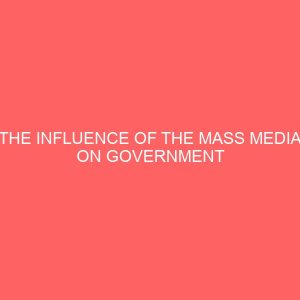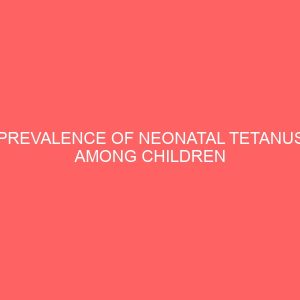Description
CHAPTER ONE
INTRODUCTION
1.1. Background of the Study
Conflict is inevitable in every society as well as organization. It occurs within groups individuals, organization, government and even among family members. Conflict between groups or organization. Potentially improves team dynamism (Mary Ann 2000). Conflict management skills is necessary for management of conflict in any organization. For any organization to be effective and efficient performing of its activities. Here is the need for mutual co-existence and understanding among members of the organization. However, conflict within an organization can emerged as a result of individuals difference, ambitions or from villainy between sub-groups or factions (Dennis, 2006).
Conflict is generated from emotions and frustration and has a detrimental impact on group or organizational outcomes i.e. information processing ability. Cognitive function of group members, attribution of group members behavior group loyalty. Work group commitment intent to stay in the present organization and job satisfaction (Jameson 2007).
Organizational conflict is a state of discord caused by the actual or perceived opposition of needs, value and interests between people working together. Conflict takes many forms in organization there is the inevitable clash between formal authority and power and those individual and group. Affected most organizational conflict are as a result of agitation by workers unions for improve condition of service and other welfare packages. In the recent past organize labour, government and owners of enterprise have been constraint with the problem of industrial conflict, hence conflict resolution as activities of industrial relation become very necessary following the disagreement between workers and management repetition (employer and employee) on the matter pertaining to either policy formulation on the welfare of workers in an organization or workers participation in decision making process on matters that boarders on their interest and welfare.
Jornab (2007), urges that agitation by worker unions for improved condition of service and other welfare package are almost always not in consonance with the interest and expectation of employers the very foundation of industrial conflicts.
Hence, the need to examine conflict resolution as a tool for effective management in SSABML very imperative.
1.2. Statement of Problem
Productivity in most organization have comparatively taken a nosedive sequence to frequent industrial conflict, the frequent agitation by workers for improved working condition and other workers interest and right. Hence optimal productivity has been hampered because of frequent industrial conflict as such many organizations has restored to different means of resolving such conflict because of its intended negative consequences such as down toll, which will affect sales, production decline, patronage and profit margin.
1.3. Objective of the Study
The objective of the study are as follows:
To identify the causes of conflict in SSABML
To examine the relevance of effective conflict management in SSABML
To examine the criteria for effective conflict resolution in SSABML
To proper possible solution to conflict in SSABML
1.4. Significance of the Study
The study will be beneficial to corporate organization especially SSABML as they utilize the finding in policy formulation regarding conflict management in their organization. The study will add to existing knowledge on conflict resolution and would be useful reference materials to individuals, students as well as scholars who may wish to undertake a similar research.
Most importantly, the study will go a long way in putting an end to unnecessary unrest in the corporate and will enhance productivity, peaceful co-existence between management and employee which will have positive impact on sales, profit, management and maximum enhancement of labour.
The research will also serves as a reference point to further research work.
1.5. Research Questions
The research questions that will guide the study are:
What are the causes of conflict in SSABML?
What is the relevance of effective conflict management in SSABML?
What are the criteria for effective conflict resolution in SSABML?
What are the positive solution to the problem of conflict in SSABML?
1.6. Scope of the Study
The study cover the examination of conflict resolution as a tool for effective management in SSABML. To this end the study will identify the criteria for effective conflict resolution as well as the relevance of effective management system in SSABML. The study will equally identify the causes of conflict in SSABML and would proffers solution to such problems.
1.7 Limitation of the Study
For the fact that this study is restricted to Sona System Association Business Management Limited (SSABML) it is not certain if the same result would be obtained if the survey is done on a different area for the fact that the questionnaire as well as the survey design are used as the instrument and the research design respectfully. Its is not certain if other kind of instruments as well as research design could yield the same result.
Other limitations arise from the uncooperative attitude of respondents as well as their non-challant attitude. This affected the validity of their response. As such incoming students as well as individual who may wish to conduct a further research should take this into cognizance.
Sona System Association Business Management (SSABML) was established in Nigeria in 1977. It first started with it first Plant in Kaduna located in Kuddenda Industrial Layout, Kaduna.
The company kick-up with franchise from Hamburg Breweries in Germany Market of Kronerburg and Sergenbre to produce Kronernburg, Serzenbre, other franchise were obtained from Malinnger Breweries in U.S.A to produce legent extra smooth and Amstel Malt.
Sona System Association Business Management Limited Kaduna (SSABML) has distribution outlet across all states in Nigeria Selling Beer and Malt Drinks to its customers.
Conflict: This is a process in which one party perceive that it interest is being opposed or negatively affected by another party.
Management: Management is the act of getting things done through people.
Conflict Management: Is a communication process in an organization that a solution when conflict arise
Organization: This is a framework for getting things done.
Strike: This is temporary withdrawal or withholding of labour power with the hope of raising its price by improving the payment of wages and other condition of employment.
Lockout: This refers to management refusal to allow employees to work.
Trade Union: This is a combination of workers or employers association form for the main purpose of regulating the terms and conditions of employment of workers.
Production: This is the process of transforming resources such as raw materials, labour and capital goods into finished product and services.
SSABML: This is an acronym for Sona System Association Business Management Limited.







